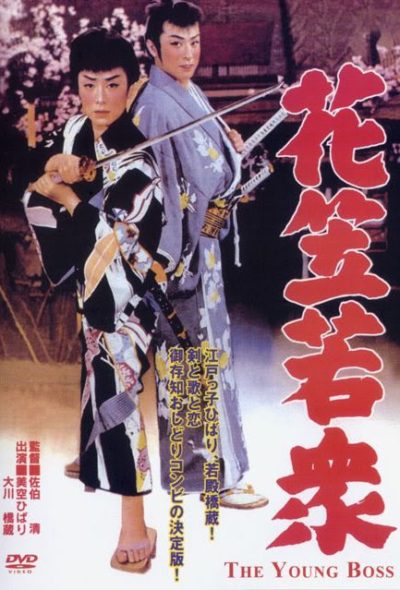★★★
“Singing samurai swings sword.”
 18 years ago, the maid to a Japanese lord had twins by him. This was, apparently, a disgrace to the family – not the affair, so much as it being twins. So it was pretended she had only given birth to one daughter, Chiyo, who was brought up as the heiress. The mother and other daughter, Yuki, were sent away and after the former died, the daughter was brought up as a sword-wielding boy, Kichisaburo, by her mother’s brother, Edoya Kichibei. However, she still has a certificate proving her birth-right, and various factions are now stirring to establish her as the “rightful” heir to the title. Or, if she’s unwilling to go along with this, the plotters will simply steal the certificate from Edoya, and use an impostor to make their claim.
18 years ago, the maid to a Japanese lord had twins by him. This was, apparently, a disgrace to the family – not the affair, so much as it being twins. So it was pretended she had only given birth to one daughter, Chiyo, who was brought up as the heiress. The mother and other daughter, Yuki, were sent away and after the former died, the daughter was brought up as a sword-wielding boy, Kichisaburo, by her mother’s brother, Edoya Kichibei. However, she still has a certificate proving her birth-right, and various factions are now stirring to establish her as the “rightful” heir to the title. Or, if she’s unwilling to go along with this, the plotters will simply steal the certificate from Edoya, and use an impostor to make their claim.
Misora has a double role here, playing both princesses. Though this dates from 1958, and any interaction uses stand-ins rather than more sophisticated techniques. Not that it matters much. She was a cultural icon, best known as a singer, selling over 80 million records during and after her lifetime. This explains the several occasions on which she bursts into song here. I was quite surprised, since I do not typically expect warbling in my samurai flicks. But she was also an actress, with over 150 films to her credit, and her performance is fine here. As usual, the “woman pretending to be a man” plotline is unconvincing, though at least the haircut and costumes help sell things in this case.
It’s certainly tame by subsequent Japanese swordplay movies, no surprise given the kinder, gentler era from which this comes. In contrast to their arterial spray, no-one here dies with more than a smudge of blood on their robes. I’d rather have seen the heroine remain as Kichisaburo throughout, rather than reverting to a “princessy” look after her sister’s betrothed shows up to bring Yuki back to her ancestral home. It’s certainly a more interesting character, complete with a minion whose purpose appears to be to rabble-rouse on her behalf, like a personal ring-announce. Witness lines such as, “If you don’t know him, you must be country bumpkins! Listen up. He helps the weak, and crushes the strong. Known as a man’s man, he’s the second generation of Edoya Kichibei.” Meanwhile, in the blue corner…
The other subsidiary characters aren’t very interesting, unfortunately, and get more screen-time than they warrant. The romantic angle – Yuki falls for her sister’s betrothed – doesn’t work, and the political shenanigans of a lot of people with similar top-knots, bog proceedings down more than they enlighten or entertain. It does better when in motion, Misora proving effective with the sword. They wisely give her a style that relies much more on speed than strength, dispatching her victims in two or three swift strokes. It also ends satisfactorily, with a surprisingly poignant ending that sees the heroine step aside and return to her former life so Chiyo can be happy. And just time for one last song, naturally!
Dir: Kiyoshi Sakei
Star: Hibari Misora, Hashizo Okawa, Denjiro Okochi, Shunji Sakai




